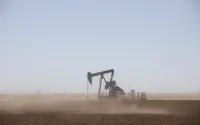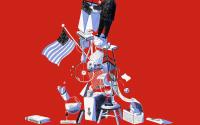11 April 2006PlanetarkJon Herskovitz
As the sky turned a jaundiced hue and visibility plunged to 1.5 km from a normal average of 10 km (6.2 miles), South Korea issued a health advisory on Saturday due to the storm described as the worst since 2002.
The dust, which originates in the Gobi Desert region of China, picks up heavy metals and carcinogens such as dioxin as it passes over Chinese industrial regions, before hitting the Korean peninsula and Japan, meteorologists say.
Dry weather and seasonal winds in China hurl millions of tonnes of sand at the Korea peninsula and Japan each spring. An official at South Korea's Meteorological Administration said by telephone more storms were expected in the coming weeks.
The state-sponsored Korea Environment Institute said the dust kills up to 165 South Koreans a year, mostly the elderly or those with respiratory ailments, and make as many as 1.8 million ill.
The United Nations Environment Programme (UNEP) has said the problem is plaguing Northeast Asia nearly five times as often as in the 1950s and is worsening with growing desertification.
COSTING BILLIONS
On Saturday, the meteorological office said people should stay indoors or wear masks if they ventured outdoors after doctors warned prolonged exposure could cause health problems such as eye and respiratory diseases.
"My children stayed indoors. I was not going to let them out to play in that polluted air," one mother in a central Seoul apartment building said.
Annual economic damage to South Korea from the storms is estimated at between 4.273 trillion won to 5.5 trillion won (US$4.49 billion to US$5.77 billion), according to the Korea Environment Institute.
The storms cancelled flights and top shipyards suspended painting of vessels at the weekend. Semiconductor producers had to increase the filtration of air coming into plants to avoid damage to sensitive chip production lines.
The storms also disrupt airborne communication systems as well as causing damage to livestock and crops, UNEP said.
Last month, the dust and sand even mixed with snow over South Korea to cause a rare sprinkling of yellow snow.
China, South Korea and Japan have established a network to share information on the issue.
Chinese authorities have also been trying to grow more trees to combat desertification, but environmentalists expect the problem to get worse without more action.
(US$1=952.5 Won)
(With additional reporting by Lee Jin-joo)






